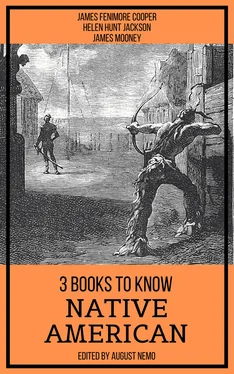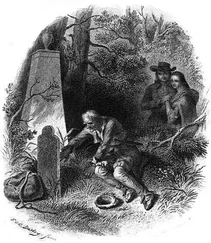“Morning is just touching them below,” said the deliberate and musing scout, “and the watchers have a mind to wake up the sleepers by the sound of cannon. We are a few hours too late? Montcalm has already filled the woods with his accursed Iroquois.”
“The place is, indeed, invested,” returned Duncan, “but is there no expedient by which we may enter? capture in the works would be far preferable to falling again into the hands of roving Indians.”
“See!” exclaimed the scout, unconsciously directing the attention of Cora to the quarters of her own father, “how that shot has made the stones fly from the side of the commandant’s house! Ay! these Frenchers will pull it to pieces faster than it was put together, solid and thick though it be.”
“Heyward, I sicken at the sight of danger that I cannot share,” said the undaunted, but anxious daughter. “Let us go to Montcalm, and demand admission: he dare not deny a child the boon.”
“You would scarce find the tent of the Frenchman with the hair on your head,” said the blunt scout. “If I had but one of the thousand boats which lie empty along that shore, it might be done. Ha! here will soon be an end of the firing, for yonder comes a fog that will turn day to night, and make an Indian arrow more dangerous than a moulded cannon. Now, if you are equal to the work, and will follow, I will make a push; for I long to get down into that camp, if it be only to scatter some Mingo dogs that I see lurking in the skirts of yonder thicket of birch.”
“We are equal,” said Cora, firmly: “on such an errand we will follow to any danger.”
The scout turned to her with a smile of honest and cordial approbation as he answered —
“I would I had a thousand men, of brawny limbs and quick eyes, that feared death as little as you! I’d send them jabbering Frenchers back into their den again, afore the week was ended, howling like so many fettered hounds or hungry wolves. But stir,” he added, turning from her to the rest of the party, “the fog comes rolling down so fast, we shall have but just the time to meet it on the plain, and use it as a cover. Remember, if any accident should befall me, to keep the air blowing on your left cheeks — or rather, follow the Mohicans; they’d scent their way, be it in day or be it at night.”
He then waved his hand for them to follow, and threw himself down the steep declivity, with free, but careful footsteps. Heyward assisted the sisters to descend, and in a few minutes they were all far down a mountain whose sides they had climbed with so much toil and pain.
The direction taken by Hawkeye soon brought the travellers to the level of the plain, nearly opposite to a sally-port in the western curtain of the fort, which lay, itself, at the distance of about half a mile from the point where he halted to allow Duncan to come up with his charge. In their eagerness, and favored by the nature of the ground, they had anticipated the fog, which was rolling heavily down the lake, and it became necessary to pause, until the mists had wrapped the camp of the enemy in their fleecy mantle. The Mohicans profited by the delay, to steal out of the woods, and to make a survey of surrounding objects. They were followed at a little distance by the scout, with a view to profit early by their report, and to obtain some faint knowledge for himself of the more immediate localities.
In a very few moments he returned, his face reddened with vexation, while he muttered his disappointment in words of no very gentle import.
“Here has the cunning Frenchman been posting a picket directly in our path,” he said; “redskins and whites; and we shall be as likely to fall into their midst as to pass them in the fog!”
“Cannot we make a circuit to avoid the danger,” asked Heyward, “and come into our path again when it is passed?”
“Who that once bends from the line of his march in a fog can tell when or how to turn to find it again! The mists of Horican are not like the curls from a peace-pipe, or the smoke which settles above a mosquito fire.”
He was yet speaking, when a crashing sound was heard, and a cannon-ball entered the thicket, striking the body of a sapling, and rebounding to the earth, its force being much expended by previous resistance. The Indians followed instantly like busy attendants on the terrible messenger, and Uncas commenced speaking earnestly and with much action, in the Delaware tongue.
“It may be so, lad,” muttered the scout, when he had ended; “for desperate fevers are not to be treated like a toothache. Come, then, the fog is shutting in.”
“Stop!” cried Heyward; “first explain your expectations.”
“’Tis soon done, and a small hope it is; but it is better than nothing. This shot that you see,” added the scout, kicking the harmless iron with his foot, “has ploughed the ‘arth in its road from the fort, and we shall hunt for the furrow it has made, when all other signs may fail. No more words, but follow, or the fog may leave us in the middle of our path, a mark for both armies to shoot at.”
Heyward perceiving that, in fact, a crisis had arrived when acts were more required than words, placed himself between the sisters, and drew them swiftly forward, keeping the dim figure of their leader in his eye. It was soon apparent that Hawkeye had not magnified the power of the fog, for before they had proceeded twenty yards, it was difficult for the different individuals of the party to distinguish each other, in the vapor.
They had made their little circuit to the left, and were already inclining again towards the right, having, as Heyward thought, got over nearly half the distance to the friendly works, when his ears were saluted with the fierce summons, apparently within twenty feet of them, of —
“Qui va là?”
“Push on!” whispered the scout, once more bending to the left.
“Push on!” repeated Heyward; when the summons was renewed by a dozen voices, each of which seemed charged with menace.
“C’est moi,” cried Duncan, dragging, rather than leading those he supported, swiftly onward.
“Bête! — qui? — moi!”
“Ami de là France.”
“Tu m’as plus l’air d’un ennemi de là France; arrête! où pardieu je te ferai ami du diable. Non! feu, camarades, feu!”
The order was instantly obeyed, and the fog was stirred by the explosion of fifty muskets. Happily, the aim was bad, and the bullets cut the air in a direction a little different from that taken by the fugitives; though still so nigh them, that to the unpractised ears of David and the two females, it appeared as if they whistled within a few inches of the organs. The outcry was renewed, and the order, not only to fire again, but to pursue, was too plainly audible. When Heyward briefly explained the meaning of the words they heard, Hawkeye halted, and spoke with quick decision and great firmness.
“Let us deliver our fire,” he said; “they will believe it a sortie, and give way, or they will wait for reinforcements.”
The scheme was well conceived, but failed in its effect. The instant the French heard the pieces, it seemed as if the plain was alive with men, muskets rattling along its whole extent, from the shores of the lake to the farthest boundary of the woods.
“We shall draw their entire army upon us, and bring on a general assault,” said Duncan: “lead on, my friend, for your own life, and ours.”
The scout seemed willing to comply; but, in the hurry of the moment, and in the change of position, he had lost the direction. In vain he turned either cheek towards the light air; they felt equally cool. In this dilemma, Uncas lighted on the furrow of the cannon-ball, where it had cut the ground in three adjacent ant-hills.
“Give me the range!” said Hawkeye, bending to catch a glimpse of the direction, and then instantly moving onward.
Читать дальше












